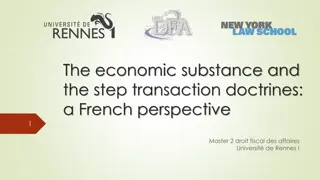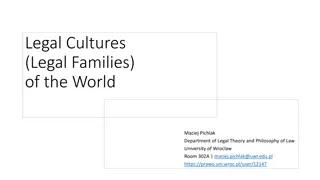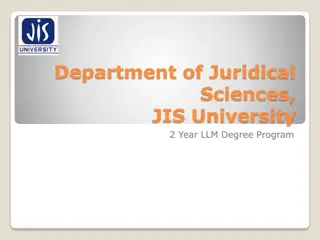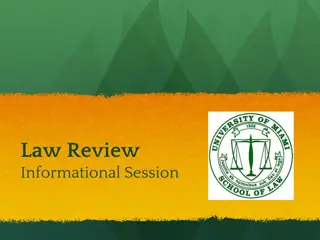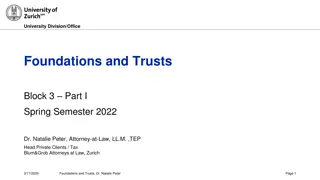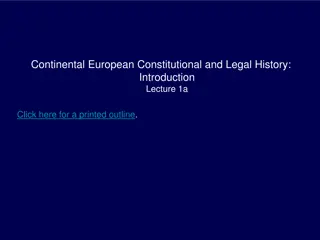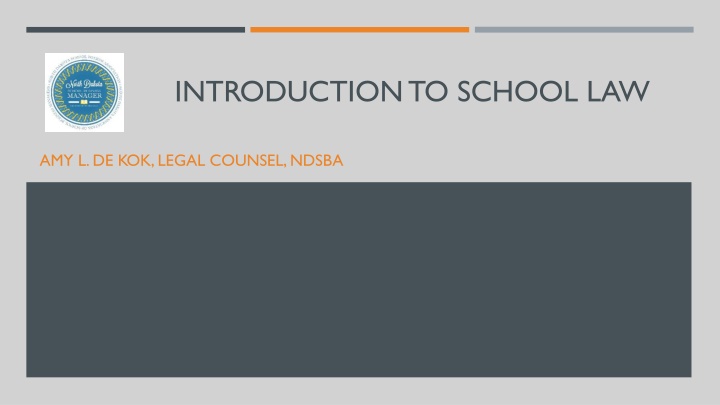
School Law and Employment Regulations in North Dakota
Explore the sources of law governing schools in North Dakota, including federal and state laws, regulations, and procedures. Learn about the North Dakota Century Code, administrative codes, and key legal aspects such as employment laws. Delve into topics like school board powers, business manager duties, and teacher contracts to ensure compliance with the law.
Download Presentation

Please find below an Image/Link to download the presentation.
The content on the website is provided AS IS for your information and personal use only. It may not be sold, licensed, or shared on other websites without obtaining consent from the author. If you encounter any issues during the download, it is possible that the publisher has removed the file from their server.
You are allowed to download the files provided on this website for personal or commercial use, subject to the condition that they are used lawfully. All files are the property of their respective owners.
The content on the website is provided AS IS for your information and personal use only. It may not be sold, licensed, or shared on other websites without obtaining consent from the author.
E N D
Presentation Transcript
INTRODUCTION TO SCHOOL LAW AMY L. DE KOK, LEGAL COUNSEL, NDSBA
SOURCES OF LAW, REGULATIONS, & PROCEDURES Federal Law: U.S. Constitution Federal Statutes and Code of Regulations (U.S.C. and C.F.R.) Federal Agencies (ED and DOL) State Law: North Dakota Constitution North Dakota Statutes and Administrative Regulations (NDCC and NDAC) State Agencies (NDDPI and DOL) ND Attorney General Opinions Local School Board: Policies and Procedures
NORTH DAKOTA CENTURY CODE NORTH DAKOTA ADMINISTRATIVE CODE
NORTH DAKOTA CENTURY AND ADMINISTRATIVE CODES North Dakota Legislative Council website: www.legis.nd.gov Title 15.1 (Elementary and Secondary Education) School Districts (Chapter 15.1-07) NDCC secs. 15.1-07-20.1 through 15.1-07-24 (Business Managers) Business Manager duties (Section 15.1-07-21) Business Manager and school district funds (Section 15.1-07-24)
NORTH DAKOTA CENTURY AND ADMINISTRATIVE CODES (CONT.) School Boards (Chapter 15.1-09) Section 15.1-09-33 (Power of School Boards) Section 15.1-09-33(27)-(29): employment and dismissal of business manager Teacher and Administrator Contracts (Chapter 15.1-15) Title 57 (Taxation) Chapter 57-15 (Tax Levies and Limitations)
NORTH DAKOTA CENTURY AND ADMINISTRATIVE CODES (CONT.) Chapter 44-04 (Open Meetings & Records) Administrative Code: Title 67 (Superintendent of Public Instruction) Title 67.1 (Education Standards and Practices Board) Title 68 (State Board of Public School Education) Title 46 (Labor Commissioner)
FEDERAL AND STATE EMPLOYMENT LAWS Wage and Hour Laws Family and Medical Leave Act Anti-Discrimination Laws
WAGE AND HOUR Fair Labor & Standards Act (FLSA) Establishes minimum wage, overtime pay, and recordkeeping standards affecting employees in the private sector and in Federal, State, and local governments Applies to elementary and secondary schools U.S. Department of Labor Wage and Hour Division: https://www.dol.gov/whd/flsa/
WAGE AND HOUR NDCC Title 34 and NDAC sec. 46-02-07 Addresses state minimum wage, overtime, and work break regulations North Dakota Department of Labor Wage and Hour Division: https://www.nd.gov/labor/wage-and-hour-topics
WAGE AND HOUR (CONT.) Public and private employers are required to pay non-exempt employees at least the minimum wage and overtime pay for more than 40 hours in a workweek $7.25 federal and state minimum wage Overtime: 1 times regular rate of pay (even if no permission to work overtime) Actual hours worked all time when an employee is required to be on employer s premises, on duty, or at a prescribed work place
WAGE AND HOUR (CONT.) Exemptions to wage and hour requirements: 1) Executive 2) Administrative 3) Professional Must meet specific requirements for each, but generally salary basis/level and job duties tests Teachers (exempt) Business Managers (non-exempt) do not exercise discretion and independent judgment in matters of significance Labels don t matter (e.g. administrative or salaried or supervisor )
WAGE AND HOUR (CONT.) Payment of final wages Due on next regular payday Certified mail at employee s address or as otherwise agreed (direct deposit) Payment of any paid time off If available to use at time of termination, then pay at regular rate of pay Breaks Shift of 5 hours, entitled to 30 minute meal break May waive break If required to work on break, then must be paid
WAGE AND HOUR (CONT.) Not required to provide vacation or sick leave (paid or unpaid) exception for teachers (NDCC 15.1-16-19) Most school districts provide some sort of PTO for employees For teachers, most often covered by Negotiated Agreement School Board policy
FAMILY AND MEDICAL LEAVE ACT (FMLA) The Family and Medical Leave Act (FMLA) is a federal law that provides eligible employees of covered employers with unpaid, job-protected leave for specified family and medical reasons
FAMILY AND MEDICAL LEAVE ACT (FMLA) Requires covered employers to provide eligible employees up to 12 work weeks of unpaid leave during a 12 month period to be used for the following reasons: Birth or placement of child Serious health condition of employee that makes employee unable to perform his/her job Care for employee s parent, spouse or child with a serious health condition Any qualifying exigency arising out of spouse, child or parent on covered active duty
FAMILY AND MEDICAL LEAVE ACT (FMLA) Covered employer: all public and private elementary and secondary schools Eligible employee: 1) Works for covered employer 2) Has worked for employer for at least 12 months (consecutive or not) as of the date the FMLA is to start; 3) Has at least 1,250 hours of service during the 12 months prior to leave; and, 4) Works at location where employer employs at least 50 employees within 75 miles of that worksite as of date when employee gives notice of need for leave
FAMILY AND MEDICAL LEAVE ACT (FMLA) Covered employers must designate how the 12 month FMLA leave period is counted Choices include: calendar year; fixed 12-month period (e.g., fiscal year) 12-month period starting on first day of FMLA leave (measured forward); or rolling 12-month period (measured backward from date employee uses any leave) Usually set by board policy
FAMILY AND MEDICAL LEAVE ACT (FMLA) Serious medical condition leave under FMLA can be taken consecutively, intermittently or on a part-time basis as necessary Unpaid leave, BUT must continue employee s group health benefits during FMLA leave (also, may require exhaustion of other leave before FMLA) At conclusion of leave, must reinstate to same or equivalent duties, pay, benefits, and terms and conditions KEEP ACCURATE RECORDS USE REQUIRED/SUGGESTED FORMS Interaction with other protected leave laws (e.g., ADA)
ANTI-DISCRIMINATION LAWS Title VII of Civil Rights Act of 1964 (Title VII) Prohibits discrimination in employment on the basis of race, color, religion, sex and national origin Applies to employers with 15 or more employees Sex discrimination includes discrimination based on pregnancy, childbirth and related medical conditions Equal Employment Opportunity Commission (EEOC) enforces Title VII Gender identity and sexual orientation
ANTI-DISCRIMINATION LAWS (CONT.) Americans with Disabilities Act (ADA) Prohibits discrimination against individuals with disabilities Applies to employers with 15 or more employees Requires employers to make reasonable accommodation for persons with disabilities so long as the accommodation does not constitute an undue hardship Disability under ADA is very broad, but must be known by employer EEOC enforces protections under ADA Interactive process duty to affirmatively act; designed to identify nature of impairment, resulting limitations and potential options for reasonable accommodation
ANTI-DISCRIMINATION LAWS (CONT.) Equal Pay Act of 1963 (EPA) & NDCC chapter 34-06.1 Prohibits employers from paying different wages to men and women if they perform equal work in same workplace. Age Discrimination in Employment Act (ADEA) Prohibits employers from discriminating against employees/applicants 40+ years old because of age. Generally applies to employers with 20 or more employees.
ANTI-DISCRIMINATION LAWS (CONT.) North Dakota Human Rights Act (NDCC chapter 14-02.4) Prohibits discrimination on the basis of race, color, religion, sex, national origin, age, the presence of physical or mental disability, status with regard to marriage or public assistance, or participation in a lawful activity off the employer s premises during nonworking hours which is not in direct conflict with the essential business-related interests of the employer Applies to all aspects of employment relationship, including hiring Failure to make reasonable accommodations for a pregnant individual also qualifies as a discriminatory practice under the Act Applies to all employers with one or more employees (however, size of employer may be a factor in what constitutes a reasonable accommodation)
OPEN RECORDS & OPEN MEETINGS North Dakota has sunshine laws, which make all government records and meetings open to the public unless a specific law authorizes a record to be withheld or a meeting to be closed These laws apply to all state and local government agencies, rural fire and ambulance districts, public schools, private businesses or non-profit organizations that are supported by or expending public funds, and contractors, if the contractor is providing services in place of a public entity rather than to that entity
OPEN RECORDS & OPEN MEETINGS Anyone has the right to attend meetings of a public entity or to access and obtain copies of the entity s records, regardless of where they live PURPOSE: The public has the right to know how government functions are performed and how public funds are spent
OPEN RECORDS & OPEN MEETINGS NDCC chapter 44-04, http://www.legis.nd.gov/cencode/t44c04.pdf North Dakota Open Records Manual https://attorneygeneral.nd.gov/sites/ag/files/documents/OpenRecordsManual.pdf North Dakota Open Meetings Manual https://attorneygeneral.nd.gov/sites/ag/files/documents/OpenMeetingsManual.pdf
OPEN RECORDS Record includes all recorded information regardless of physical form (e.g. paper, e-mail, computer file, photograph, audiotape or recording, video, text message, etc.) that has a connection with how public funds are spent or with the public entity s performance of its governmental functions or its public business, regardless of format or location Does not include unrecorded thought processes or mental impressions But does include preliminary drafts and working papers Includes electronic records Minutes, memos, reports, outlines, notes, employee salary and job performance records, contracts, telephone records, and travel vouchers are all OPEN records and must be provided upon request
OPEN RECORDS A request for public records can be made in any available medium (in writing or in person) Generally, a public entity cannot ask why the records are requested, ask for identification, or require a request be made in writing However, a request must reasonably identify existing records
OPEN RECORDS Don t have to create a record if it does not exist at time of request If a request is unclear, the entity may require written clarification but cannot ask the requester s motive or identity. The entity can delay taking action until receiving written clarification Business manager usually involved in responding to requests
OPEN RECORDS The public entity must respond to a record request within a reasonable time, by either providing the record or explaining the legal authority for denying all or part of the request. What is reasonable depends on a number of factors, including the scope and type of records requested. A public entity may only deny access to or a copy of a record for which there is a specific statute closing all or part of the information. If deny access, must provide a reason.
OPEN RECORDS A statute may declare certain records to be exempt or confidential. If a record is exempt, a public entity has discretion to release or withhold it (e.g., public employee personal information) If a record is confidential, it either cannot be released or the confidential information within the record first must be redacted (e.g., public employee medical treatment or use of employee assistance program)
OPEN RECORDS Can the district charge? $25 per hour per request, excluding the first hour, for locating records, including electronic records, if locating requires more than one hour. $25 per hour per request, excluding the first hour, for excising confidential or closed material. 25 cents per impression of a paper copy. Postage The entity can require full payment of any estimated costs before starting to make copies or releasing records An entity does not have to convert its records to another format, create or compile records that do not exist, or obtain records originating from another public entity that it does not have in its possession
OPEN RECORDS CONFIDENTIAL OR EXEMPT Student information, Family Educational Rights and Privacy Act (FERPA), 20 USC 1232g; 34 CFR Part 99, NDCC 44-04-18.13 Financial account numbers, NDCC 44-04-18.9 Private email and telephone numbers, NDCC 44-04-18.21 Employee personal, medical, and employee assistance records, NDCC 44-04-18.1 Criminal history records, NDCC 12-60-16.5, 12-60-16. Financial account numbers, NDCC 44-04-18.9 Social security numbers, NDCC 44-04-28 Attorney work product and active investigatory work product, NDCC 44-04-19.1 Applications for employment with a public entity, NDCC 44-04-18.27
OPEN MEETINGS Meeting means any gathering of a quorum of the members of a governing body of a public entity regarding public business. This includes: Board committees and subcommittees, Informal gatherings or work sessions, and Discussions where a quorum of members are participating by phone or any other electronic communication (either at the same time or in a series of individual contacts). Training seminars and purely social gatherings attended by a quorum of a public entity are not meetings, however, as soon as the members discuss any public business, it becomes a meeting.
OPEN MEETINGS WHAT IS A GOVERNING BODY? The term meeting is limited to gatherings of a governing body of a public entity Governing body includes "the multimember body responsible for making a collective decision on behalf of a public entity Also includes any group of persons, regardless of membership, acting collectively pursuant to authority delegated to that group by the governing body Whenever a governing body delegates any public business to two or more people, a committee is formed that is subject to the same open meeting requirements as the original governing body Delegation can be to any group of people, including non-members No formal motion necessary as along as it is apparent that it is a collective decision
OPEN MEETINGS REGULAR MEETING SCHEDULE If the governing body holds regularly scheduled meetings, the schedule of these meetings must be posted annually on the entity s official website OR filed with the County Auditor The annual meeting schedule also must be furnished to anyone who requests the information School Boards generally create schedule at annual meeting
OPEN MEETINGS NOTICE Prior written notice is required for all meetings of a public entity, including committees and subcommittees. Generally, there is no minimum advance notice period for public meetings However, an entity must provide public notice of the date, time and location of a meeting when the governing body is notified As soon as an agenda is prepared and given to the governing body, it must be posted and provided to the public in the same manner as the meeting notice If an executive session is anticipated, the meeting notice also must include the executive session as an agenda item, along with the subject matter and the legal authority for the executive session Regular meeting agendas may be added to or altered at the time of the meeting. For special or emergency meetings, however, only the specific topics included in the notice may be discussed
OPEN MEETINGS - NOTICE At the same time the governing body is notified of the meeting, the meeting notice must be: 1) Posted at the main office of the public entity, if the entity has a main office. 2) Posted at the location of the meeting, if held somewhere other than the entity s main office. 3) Posted on the public entity s website OR filed with the county auditor. 4) Provided to any individual who has requested notice of the meeting. Notice of special or emergency meetings also must be given to the entity s official newspaper Generally, there is no requirement that the meeting notice be published
OPEN MEETINGS EXECUTIVE SESSIONS Only the portions of a public meeting that are specifically confidential or exempt from the open meetings law may be closed to the public and held in executive session The remainder of the meeting must be open to the public Generally, a public entity may not close a meeting to discuss salary issues or employee job performance/personnel issues Exceptions: nonrenewal and discharge hearings, discussion of closed/confidential records, attorney consultation, and negotiations strategy Board action must typically occur in open session
OPEN MEETINGS - MINUTES The minutes of meetings are public records and must be provided to anyone upon request Draft minutes should be made available to the public even if the minutes have not been approved This requirement applies to all governing bodies, including committees and subcommittees Some public entities are required by law to publish minutes in the official newspaper (NDCC 15.1-09-31) Is business manager only person who can take minutes??
OPEN MEETINGS - MINUTES Minutes must include, at a minimum: The names of the members attending the meeting; The date and time the meeting was called to order and adjourned; A list of topics discussed regarding public business; A description of each motion made at the meeting and whether the motion was seconded; The results of every vote taken at the meeting; and The vote of each member on every recorded roll call vote
RECENT CHANGES ELECTRONIC MEETINGS HB 1349 Codified into law ability of a public entity to hold meetings by electronic means and to provide public access by electronic means May conduct meetings solely electronically or partially electronically If electronic and in-person (e.g., board member is attending electronically), still need to provide means of those in attendance to access electronic portion If solely electronic, all information necessary to join meeting must be included in the notice
CONTRACT LAW BASICS Contract an agreement with specific terms between two or more persons or entities in which there is a promise to do something in return for a valuable benefit known as consideration Numerous contracts in school district: Employment contracts Teachers, principals, superintendents Negotiated Agreement / Master Contract Contracts requiring expenditure of public funds (bidding requirement if cost in excess of $50,000, with some exceptions, NDCC 15.1-09-34)
AT-WILL EMPLOYEES V. CONTRACT EMPLOYEES AT-WILL CONTRACT Employment until the end of the contract term. Employee can resign from the contract if employer accepts. Employer can discharge the employee for cause in some circumstances (for teachers NDCC 15.1-15-07, 08). Teachers, principals, superintendents have continuing contract rights in most circumstances, but board may nonrenew for performance or RIF (for teachers 15.1- 15-05, 06). Generally, if contract employment, cannot terminate but for cause. Either party (employer or employee) can terminate the employment relationship at any time, with or without cause. An employer may not, however, terminate an employment relationship on the basis of the employee s protected status (race, religion, sex, age, disability, etc.) Majority of staff presumed to be at-will (classified, non- certified), unless the board decided to enter into contract with them. Can change the at-will status of employment by making a promise of duration of employment and no termination but for cause. Business managers are at-will employees.
FINAL ASSIGNMENT AND EXAM The following reading assignments must be completed before taking the final exam: North Dakota Open Meetings Manual North Dakota Open Records Manual North Dakota Century Code Chapters 15.1-06, 15.1-07, 15.1-09, 15.1-15, and 16.1-10 Complete the required assignment and online exam by May 15, 2023








